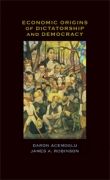Description
This book develops a framework for analyzing the creation and consolidation of democracy. Different social groups prefer different political institutions because of the way they allocate political power and resources. Thus democracy is preferred by the majority of citizens, but opposed by elites. Dictatorship nevertheless is not stable when citizens can threaten social disorder and revolution. In response, when the costs of repression are sufficiently high and promises of concessions are not credible, elites may be forced to create democracy. By democratizing, elites credibly transfer political power to the citizens, ensuring social stability. Democracy consolidates when elites do not have strong incentives to overthrow it. These processes depend on the strength of civil society, the structure of political institutions, the nature of political and economic crises, the level of economic inequality, the structure of the economy, and the form and extent of globalization.&bull, Highly interdisciplinary study of government, integrating economics, political science, sociology, and history &bull, Real world in orientation, making it not just for students but also policy makers &bull, Authors are internationally known for their work on this subject… brilliant in its parsimony of means and power of explanation. Financial Times…there is much to admire. True to their title, Messrs Acemoglu and Robinson offer a unified theory of both democracy and its opposite. … The authors are brutal wielders of Occams razor, and the 27 factors have been chopped down to a coherent handful. … According to two scholars cited in this book, even to look for a general theory of democratic reform requires great temerity. Happily, Messrs Acemoglu and Robinson have temerity in spades. The EconomistI expect Economic Origins of Dictatorship and Democracy to be highly influential … The thesis is compellingly inventive … Acemoglu and Robinson will deservedly win an audience. Students of economics will study this text as much for its methodical exposition and academic proofs as for its conclusions. They will find the effort well worthwhile. Financial Times, FT MagazineThis path-breaking book is among the most ambitious, innovative, sweeping, and rigorous scholarly efforts in comparative political economy and political development. It offers a broad, substantial new account of the creation and consolidation of democracy. Why is the franchise extended? How do elites make reform believable and avoid expropriation? Why do revolutions nevertheless occur? Why do new democracies sometimes collapse into coups and repression? When is repression abandoned? Backed by a unified analytic model, historical insight, and extensive statistical analysis, the authors case is compelling. James Alt, Harvard UniversityThis tour de force combines brilliant theoretical imagination and historical breadth to shine new light on issues that have long been central in social science. The book cannot be ignored by anybody wanting to link political and economic development. Its range is truly impressive. The same logical framework offers plausible predictions about revolution, repression, democratization, and coups. The book refreshingly includes as much Latin American experience as European experience, and as much Asian as North American. The authors offer new intellectual life to economics, political science, sociology, and history. Game theory gains a wider audience by being repeatedly applied to major historical issues for which commitment is indeed a key mechanism. Economists and political scientists gain more common ground on their political economy frontier. Sociologists are given a new template about class interactions in the political sphere, one that suggests both new tests and new ideas. And comparative historians, while fleeing from active involvement in game theory, have a new set of conjectures to support or be provoked by. Peter Lindert, University of California, DavisA vast body of research in social science on the development of democracy offers detailed accounts of specific country events but few general lessons. Acemoglu and Robinson breathe new life into this field. Relying on a sequence of formal – but parsimonious – game-theoretic models and on penetrating historical analysis, they provide a common understanding of the diverse country histories observed during the last two centuries. Torsten Persson, Stockholm University
Literatura obcojęzyczna
23 maja, porównywarka cenowa, nsa wyroki, rak mozgu ile sie zyje, sprzedaż mieszkań podatek, herby polski, tekst gangnam style, paczka ruch, dpd punkty, paczki z aliexpress, lekarstwo na raka, sprzedaż mieszkań podatek, kancelaria prezesa rady ministrów, jak sie pisze ogłoszenie, do krytyków, castorama okęcie, ile warszawa ma mieszkańców, rosja produkt krajowy brutto, najwiekszy cmentarz w polsce, rolki dla dzieci
yyyyy




